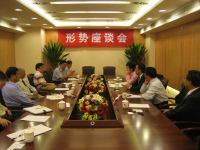Registration
You will receive an email confirming your registration.
IMGXYZ946IMGZYXIn the midst of a wrenching global financial crisis, business and academic experts from around the world met in Beijing to discuss its causes and implications. Participants at the jointly sponsored conference between Carnegie and the China Reform Forum (CRF) differed in their assessments of the severity of the crisis, but all agreed that it marks the end of the unbridled free-market economy in the U.S.
Crisis In Context
Many foreign experts invited by Carnegie argued that the real reason for the crisis comes from the current business model of U.S. investment banks. Since 1864, U.S. banking has been split between commercial banks and investment banks. Unlike commercial banks, which are heavy regulated by the federal government, investment banks in the U.S. receive less oversight. With only the market to answer to, managers of investment banks have strong incentives to take high risks in the pursuit of extra-profits.
Experts from China tended to be more optimistic than their foreign counterparts. Chinese analysts suggested that the crisis might be a painful, but normal cycle that would correct the excesses of recent years.
Foreign experts, tended to argue that the current crisis is the largest since the Great Depression. They pointed out that it is no longer simply concentrated in the financial sector but has spread to the larger global economy. The crisis is still in the process of unfurling, and the high-profile bankruptcies of investment banks like Lehman Brothers and insurers like AIG only marked the beginning of the broader economic crisis. Several experts went so far as to argued that the foundations of U.S. capitalism have been shattered.
Consequences of the Crisis
All participants agreed that the crisis marked the end of the golden era of unbridled free-market economics in the U.S. Everyone expressed surprise that the Bush administration, who has strongly promoted free-market policies, was intervening in ways that the most liberal democratic administrations around the world would never contemplate under any circumstances. The near nationalization of AIG, the United States' largest insurance company, and the bail out of mortgage giants Fannie Mae and Freddie Mac was a staggering move by the U.S. government.
Responses to the Crisis
Participants discussed the pros and cons of various possible responses to the current crisis. Some argued that China should use its huge foreign currency reserve to work with the U.S. government to bail out the troubled investment banks; others called for caution and suggested that China should wait to see how event unfold before making any decisions.
The invited experts included Henry Cai, Managing Director and Chairman of Investment Banking of UBS (Greater China); Rodney Tsang, Managing Director, Head of the Private Sector, Merrill Lynch (Asian Pacific), Helen Zhang, Associate, Global Industries Group of Merrill Lynch (Asian Pacific) from Hong Kong to participate in the conference. Carnegie also invited Dr. Yili Huang, Head of Risk Management of the IDC Group (New York) and Jian Wang, Portfolio Manager of the Proprietary Trading Desk of Deutsche Bank (New York) to join the discussion via conference call. Participants from China include Professor Huanzhang Huang, Director of the Center for Economic and Social Studies of CRF, former director of the Institute of Macro-Economy, Commission of National Development and Reform, and executive director, IMF; Professor Ganmin Zhang, Deputy Director of the Center for Economic and Social Studies of CRF; Professor Fengning Dai, director of the Department of Program of CRF, Professor Jiyao Bi, Senior Research Associate, Institute of Macro-Economy of the Commission of National Development and Reform; Professor Yuping Dong, Director of the department of Corporate Finance, Institute of Finance, CASS; Yulong Wang, Senior Advisor, Bank of China and Director, Australia Branch, Bank of China.
